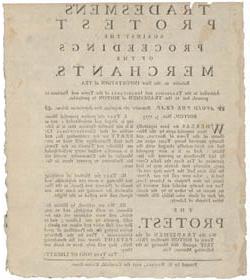Tradesmen's Protest against the Proceedings of the Merchants ...
To order an image, navigate to the full
display and click "request this image"
on the blue toolbar.
-
Choose an alternate description of this item written for these projects:
- Main description
[ This description is from the project: Coming of the American Revolution ]
This broadside defends the rights of merchants to import British tea, in violation of their fellow merchants' adherance to nonimportation, and denounces a proposed meeting on the matter as "illegal and underhanded." The publishing of this broadside did little to prevent the ensuing raid on Richard Clarke's King Street tea shop.
The "True Sons of Liberty" Weigh In
Two of Boston's appointed tea agent firms, Richard Clarke & Sons and Thomas & Elisha Hutchinson, are enemies of nonimportation. The Hutchinsons, sons of Massachusetts' governor, have forthrightly imported dutied tea, boldly violating their fellow merchants' agreements over the course of two years. Despised by Boston's patriots, the tea agents receive a late night summons on 2 November 1773: at noon the next day, they are to appear at the Liberty Tree and resign their commissions. The tea agents decline the invitation. Instead, they--or others acting on their behalf--issue a broadside defending their rights. Their logic does not forestall a visit from the mob, which storms Clarke's King Street shop, sending the tea agents fleeing for safety.
Questions to Consider
1. What commercial arguments does the broadside advance? What are its constitutional arguments?
2. How would you describe the tone of the broadside?
Further Exploration
3. What is the significance of the pen name used on the broadside? Explain.
4. On 25 October 1773, Thomas Mifflin, writing as Scaevola, comments on the tea tax in an article published in The Boston Gazette, and Country Journal (Click here to read the article.) Compare Mifflin's arguments to those presented here by the "True Sons of Liberty." Which do you find most persuasive? Why?

